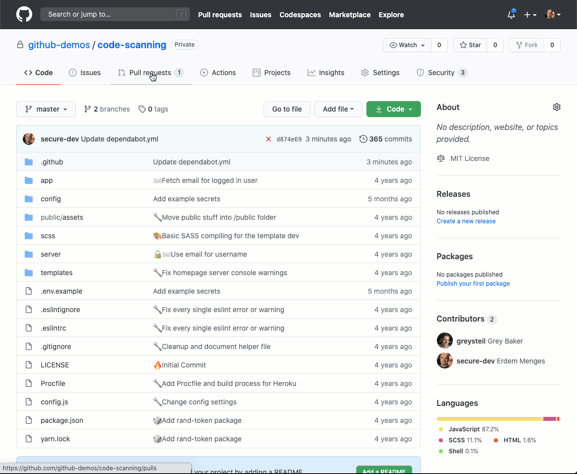
GitHub code scanning is a developer-first, GitHub-native approach to easily find security vulnerabilities before they reach production. We’re thrilled to announce the general availability of code scanning. You can enable it on your public repository today!
One year ago, GitHub welcomed Semmle. We’ve since worked to bring the revolutionary code analysis capabilities of its CodeQL technology to GitHub users as a native capability. At GitHub Satellite in May, we released the first beta of our native integration: code scanning. Now, thanks to the thousands of developers in the community who tested and gave feedback, we’re proud to announce that code scanning is generally available.
Code scanning helps you prevent security issues in code
Code scanning is designed for developers first. Instead of overwhelming you with linting suggestions, code scanning runs only the actionable security rules by default so that you can stay focused on the task at hand.
Code scanning integrates with GitHub Actions—or your existing CI/CD environment—to maximize flexibility for your team. It scans code as it’s created and surfaces actionable security reviews within pull requests and other GitHub experiences you use everyday, automating security as a part of your workflow. This helps ensure vulnerabilities never make it to production in the first place.
Code scanning is powered by CodeQL—the world’s most powerful code analysis engine. You can use the 2,000+ CodeQL queries created by GitHub and the community, or create custom queries to easily find and prevent new security concerns.
Built on the open SARIF standard, code scanning is extensible so you can include open source and commercial static application security testing (SAST) solutions within the same GitHub-native experience you love. You can integrate third-party scanning engines to view results from all your security tools in a single interface and also export multiple scan results through a single API. We’ll share more on our extensibility capabilities and partner ecosystem soon, so stay tuned.
Exciting results so far!
Since introducing the beta in May, we’ve seen tremendous adoption within the community:
- We’ve scanned over 12,000 repositories 1.4 million times, and found more than 20,000 security issues including remote code execution (RCE), SQL injection, and cross site scripting (XSS) vulnerabilities.
- Developers and maintainers fixed 72% of reported security errors identified in their pull requests before merging in the last 30 days. We’re proud to see this impact, given industry data shows that less than 30% of all flaws are fixed one month after discovery.
- We’ve had 132 community contributions to CodeQL’s open sourced query set.
- We’ve partnered with more than a dozen open source and commercial security vendors to allow developers to run CodeQL and industry leading solutions for SAST, container scanning, and infrastructure as code validation side-by-side in GitHub’s native code scanning experience.
Hear from teams already using it
Code scanning is free for public repositories and is a GitHub Advanced Security feature for GitHub Enterprise. Here’s what some teams have shared about their experience with code scanning so far:
“We chose Advanced Security for its out-of-the-box functionality and the custom functionality that we can build off of. Instead of it taking a full day to find and fix one security issue, we were able to find and fix three issues in the same amount of time.”
– Charlotte Townsley, Director of Security Engineering, Auth0
“GitHub allows us to enable security, versus enforcing it. The sooner we can catch vulnerabilities and product issues, the better it is for the company in the long run.”
– James Hurley, Director of Developer Services, McKesson Labs
“If Advanced Security reports error issues, the pull request isn’t allowed to be merged. If a security issue is found, we’re informed immediately. We go over anything GitHub has highlighted, and we make sure that it’s resolved before releasing a stable release. For the developer who will press the merge button, it inspires confidence.”
– Dimosthenis Kaponis, CTO, Netdata
Enable code scanning for public and private repositories
- Code scanning is free for public repositories. Learn more about how to enable code scanning today.
- For private repositories, code scanning is available to GitHub Enterprise through Advanced Security. Contact Sales to learn more.
- For those interested in helping to secure the open source ecosystem, we also invite you to contribute to the growing list of CodeQL queries and become part of our growing security community.
About the Author
 Justin Hutchings is a product leader with a 13 years experience in building security features for developers. He worked with worldwide known technology companies, including Microsoft and Rose-Hulman Institute of Technology. Currently he’s a Staff Product Manager at GitHub – a code hosting platform that lets programmers from around the world work together and build new projects.
Justin Hutchings is a product leader with a 13 years experience in building security features for developers. He worked with worldwide known technology companies, including Microsoft and Rose-Hulman Institute of Technology. Currently he’s a Staff Product Manager at GitHub – a code hosting platform that lets programmers from around the world work together and build new projects.
LinkedIn: https://www.linkedin.com/in/hutchingsjustin/
The post Github Code Scanning: vulnerability scanner by Justin Hutchings appeared first on Hakin9 – IT Security Magazine.
The post Github Code Scanning: vulnerability scanner by Justin Hutchings appeared first on Malware Devil.
https://malwaredevil.com/2020/12/03/github-code-scanning-vulnerability-scanner-by-justin-hutchings/?utm_source=rss&utm_medium=rss&utm_campaign=github-code-scanning-vulnerability-scanner-by-justin-hutchings



No comments:
Post a Comment